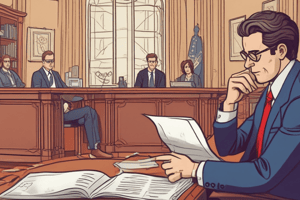Podcast
Questions and Answers
What should counselors do to ensure they understand their legal obligations?
What should counselors do to ensure they understand their legal obligations?
Which of the following is a client's right when faced with a subpoena?
Which of the following is a client's right when faced with a subpoena?
What must counselors consider in addition to maintaining client confidentiality?
What must counselors consider in addition to maintaining client confidentiality?
In addition to professional codes of ethics, what must counselors adhere to?
In addition to professional codes of ethics, what must counselors adhere to?
Signup and view all the answers
What is a counselor's responsibility when consulting with an attorney after receiving a subpoena?
What is a counselor's responsibility when consulting with an attorney after receiving a subpoena?
Signup and view all the answers
What is a key ethical principle that guides counselors when facing a subpoena?
What is a key ethical principle that guides counselors when facing a subpoena?
Signup and view all the answers
In the United States, what do confidentiality laws primarily aim to protect?
In the United States, what do confidentiality laws primarily aim to protect?
Signup and view all the answers
According to the American Counseling Association's Code of Ethics, what should counselors prioritize regarding their clients?
According to the American Counseling Association's Code of Ethics, what should counselors prioritize regarding their clients?
Signup and view all the answers
When receiving a subpoena, what legal request may counselors have to balance with client confidentiality?
When receiving a subpoena, what legal request may counselors have to balance with client confidentiality?
Signup and view all the answers
Which is a common professional responsibility for counselors when dealing with subpoenas?
Which is a common professional responsibility for counselors when dealing with subpoenas?
Signup and view all the answers
Study Notes
Counselors Consulting with an Attorney after Receiving a Subpoena: Ethical Considerations, Confidentiality Laws, Client Rights, Legal Obligations, and Professional Responsibilities
Counselors are professionals who have special training and knowledge to help people deal with personal, social, and psychological challenges. They are bound by ethical standards and professional codes of conduct. Sometimes, counselors may face situations where they must consult with an attorney after receiving a subpoena. This article will discuss the ethical considerations, confidentiality laws, client rights, legal obligations, and professional responsibilities of counselors in such circumstances.
Ethical Considerations
When counselors face a subpoena, they may have to decide whether to comply with the legal request or protect the confidentiality of their clients. They must consider the ethical principles that guide their practice, such as the American Counseling Association's (ACA) Code of Ethics. The ACA Code of Ethics suggests that counselors should respect the rights and dignity of all people, including their clients, and maintain clients' privacy. Counselors should also avoid harming their clients or exploiting their clients' trust.
Confidentiality Laws
Confidentiality laws protect the privacy of clients. In the United States, counselors are generally required to maintain the confidentiality of their clients' information. The Health Insurance Portability and Accountability Act (HIPAA) and the Health Information Technology for Economic and Clinical Health (HITECH) Act are two federal laws that uphold confidentiality. Counselors should consult with an attorney to determine the specific confidentiality requirements in their state.
Client Rights
Counselors should inform their clients about the subpoena and their client's rights. Clients have the right to be informed about the subpoena and the potential consequences of complying or not complying. They also have the right to seek legal advice. Counselors should discuss the options available to their clients and help them make an informed decision.
Legal Obligations
Counselors must comply with legal obligations. They must follow the laws and regulations of their state, and they may be required to testify in court. Counselors should consult with an attorney to understand their legal obligations and the potential consequences of not complying with a subpoena.
Professional Responsibilities
Counselors have professional responsibilities. They must adhere to their professional codes of ethics and the laws of their state. They must also maintain ethical and professional conduct. Counselors should consult with an attorney to understand their professional responsibilities and the potential consequences of not adhering to them.
In conclusion, counselors must consider ethical considerations, confidentiality laws, client rights, legal obligations, and professional responsibilities when consulting with an attorney after receiving a subpoena. They must maintain the confidentiality of their clients, inform clients of their rights and options, comply with legal obligations, and adhere to their professional codes of ethics. Counselors should consult with an attorney to understand the specific requirements and potential consequences of not complying with a subpoena.
Studying That Suits You
Use AI to generate personalized quizzes and flashcards to suit your learning preferences.
Description
Explore the ethical considerations, confidentiality laws, client rights, and legal obligations that counselors must navigate when consulting with an attorney after receiving a subpoena. Understand the importance of maintaining confidentiality, informing clients of their rights, complying with legal obligations, and upholding professional responsibilities.




